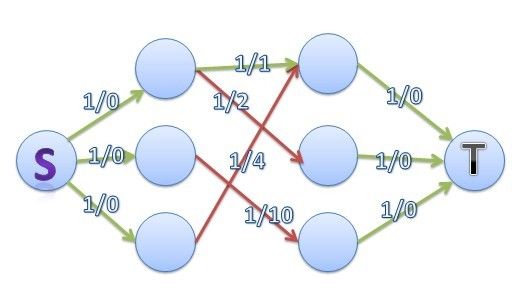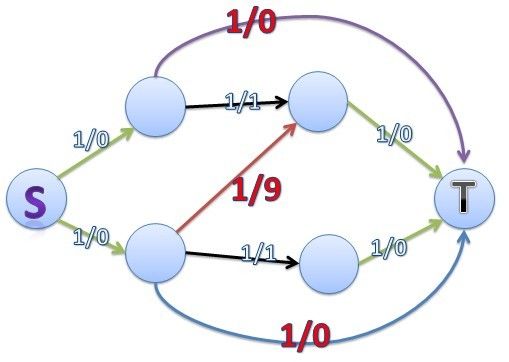HDU 3395 Special Fish
此题解转载自http://hi.baidu.com/aekdycoin/item/b0ae3412caf3a09b99ce33d9
很容易想到这种构图!

直接构造超级源S,向左边点集连边 1/0 (流量1,费用0,下同)
构造超级汇T,右边点集向T连边 1/0 (流量1,费用0)
而其他的边,都为流量1,费用为他们的原先权值
于是可以知道上图中的红色边集对应了一个最优匹配,其匹配数为3,权和为16
不过很可惜这么构图完全是错误的,只不过是YY而已

答案是2?
如果最大费用最大流,那么答案的却是2,可是答案显然是9,既取得最优权和的时候不一定匹配数最大!
(-_-我以前一直以为是最大,我蒟蒻……)
于是解决方案就不难想到(感谢SCU ISAP的大神……)

将费用变成负值,然后跑最小费用最大流就行了
学到了一点:
最大匹配不一定等于最优匹配
在cost优先的情况下,建图要满足能够让最大流相同
#include <algorithm>
#include <iostream>
#include <iomanip>
#include <cstring>
#include <climits>
#include <complex>
#include <fstream>
#include <cassert>
#include <cstdio>
#include <bitset>
#include <vector>
#include <deque>
#include <queue>
#include <stack>
#include <ctime>
#include <set>
#include <map>
#include <cmath>
#define CLR(x,y) memset(x,y,sizeof(x))
#define mp(x,y) make_pair(x,y)
#define eps 1e-9
#define INF 0x3f3f3f3f
using namespace std;
typedef long long ll;
typedef long double ld;
typedef pair<ll, ll> pll;
typedef complex<ld> point;
typedef pair<int, int> pii;
typedef pair<pii, int> piii;
template<class T>
inline bool read(T &n)
{
T x = 0, tmp = 1; char c = getchar();
while((c < '0' || c > '9') && c != '-' && c != EOF) c = getchar();
if(c == EOF) return false;
if(c == '-') c = getchar(), tmp = -1;
while(c >= '0' && c <= '9') x *= 10, x += (c - '0'),c = getchar();
n = x*tmp;
return true;
}
template <class T>
inline void write(T n)
{
if(n < 0)
{
putchar('-');
n = -n;
}
int len = 0,data[20];
while(n)
{
data[len++] = n%10;
n /= 10;
}
if(!len) data[len++] = 0;
while(len--) putchar(data[len]+48);
}
//-----------------------------------
const int MAXN=205;
struct Node
{
int v , w , s ;
int next ;
} e[100005];
int val[MAXN],head[MAXN],tot;
int pre[MAXN],vis[MAXN],dis[MAXN];
int cost,flow;
char a[MAXN][MAXN];
void init()
{
CLR(head,-1);
tot=0 ;
}
void addedge(int u,int v,int w,int s)
{
e[tot].v = v ; e[tot].w = w ; e[tot].s = s ;
e[tot].next = head[u] ; head[u] = tot++ ;
e[tot].v = u ; e[tot].w = 0 ; e[tot].s = -s ;
e[tot].next = head[v] ; head[v] = tot++ ;
}
int spfa(int s,int t)
{
int u , v , i ;
CLR(dis,INF);
dis[s] = 0 ; vis[s] = 1 ;
pre[s] = pre[t] = -1 ;
queue <int> Q ;
Q.push(s) ;
while( !Q.empty() )
{
u = Q.front();
Q.pop();
vis[u] = 0 ;
for(i = head[u] ; ~i ; i = e[i].next)
{
v = e[i].v ;
if( e[i].w && dis[v] > dis[u] + e[i].s )
{
dis[v] = dis[u] + e[i].s ;
pre[v] = i ;
if( !vis[v] )
{
vis[v] = 1 ;
Q.push(v) ;
}
}
}
}
if( pre[t] == -1 )
return 0 ;
return 1 ;
}
int f(int s,int t)
{
CLR(pre,-1);
CLR(vis,0);
int i,mi ;
cost=flow=0;
while(spfa(s,t))
{
mi=INF ;
for(i=pre[t]; ~i ;i=pre[e[i^1].v])
if(e[i].w < mi)
mi = e[i].w ;
flow+=mi;
cost+=dis[t]*mi;
for(i=pre[t]; ~i ;i=pre[e[i^1].v])
{
e[i].w-=mi;
e[i^1].w+=mi;
}
}
return -cost;
}
int main()
{
int n;
while(read(n)&&n)
{
init();
int s=0,t=2*n+1;
for(int i=1;i<=n;i++)
{
read(val[i]);
addedge(s,i,1,0);
addedge(i+n,t,1,0);
addedge(i,t,1,0);
}
for(int i=1;i<=n;i++)
scanf("%s",a[i]+1);
for(int i=1;i<=n;i++)
for(int j=1;j<=n;j++)
if(a[i][j]=='1')
addedge(i,j+n,1,-(val[i]^val[j]));
cout<<f(s,t)<<endl;
}
return 0;
}